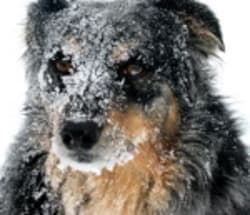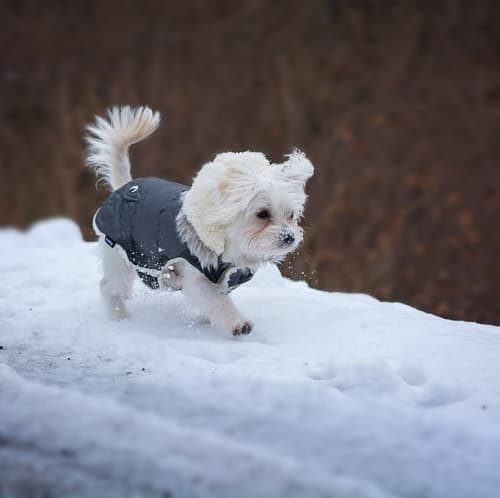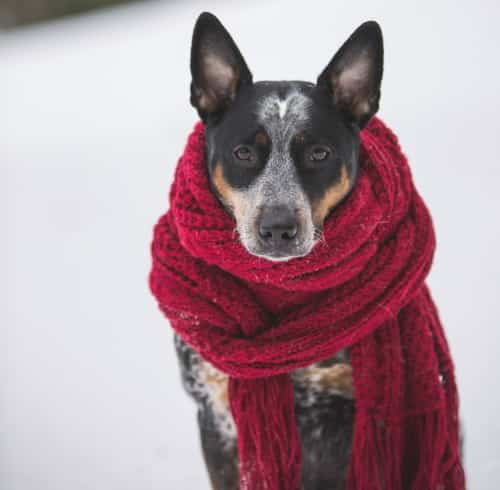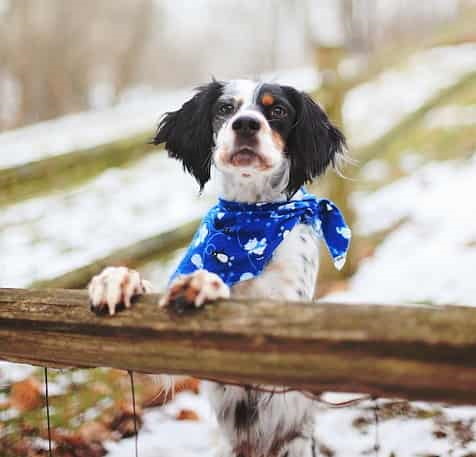Dogs And Cold Weather
How Well Is Your Dog Protected?
Dogs and cold weather - According to the ASPCA, cold weather can lead to hypothermia in dogs, which occurs when body temperature drops below 99°F (37.2°C). A statistic could indicate that cases of frostbite in dogs rise significantly when temperatures drop below 32°F (0°C).
What this means for pet parents is to take stock of your dog's outdoor shelter. You may have wondered if dogs get cold in the winter. The short answer is yes, some breeds more so than others. Hopefully, your dog never looks as cold as the one pictured here!

Importance Of Insulated Shelters
So, in order to protect our best friends, let's start with the top priority which is to make sure
your dog has a doghouse where he will be warm and sheltered against the elements.
The fact is, if your dog is outside for longer than you planned, or bad weather comes up
suddenly, the importance of an insulated doghouse can become paramount to his survival.
For more protection, add a door if his house doesn't already have one to help prevent heat loss. Another good idea is to move the doghouse to an area with more sun exposure. You may even want to consider adding a heating unit to the house for the max comfort.

Weather Conditions
Cold "temperatures" are not the only thing to watch in bad conditions. The weather may often be
far harsher than the numbers on your thermometer indicate, if the wind chill factor increases.
Freezing rain is another weather condition you wouldn't want anyone to endure for any length of time, much less your pet.
Also, be aware that your pet's extremities - feet, ears and tail - are the most vulnerable targets for frost bite, something to be avoided at all costs!
Dog Breeds Affected by Weather
Some dog breeds thrive in cold weather - in fact they quite likely prefer it. Those breeds, for example, would include:
- Siberian Husky: Known for their thick double coat, they thrive in cold climates.
- Alaskan Malamute: Another breed designed for cold, with a dense fur coat and strong build.
- Saint Bernard: Historically used for rescue in snowy conditions, they have a thick, insulating coat.
On the other hand, some breeds are more sensitive and struggle in colder temperatures. The cold-sensitive breeds, would include:
- Chihuahua: With their short coat and small size, they are prone to getting cold quickly.
- Dachshund: Also sensitive to cold due to their shorter stature and coat type.
- Greyhound: With little body fat and short hair, they require extra protection from the cold.
In addition to the breeds named above, many other breeds of course would fit into either one of these categories.
Knowing a dog's breed characteristics can be helpful to pet parents in assessing the needs of their dog in various weather conditions.
Dogs And Cold Weather - Keep Those Potty Breaks Short!
Obviously you'll want your dog to be inside most of the time during the winter months, but when he has to make a trip outside, make sure it isn't a long one.
Dogs that mostly live outside will
have developed thicker coats to protect them from the winter's chill, but wise owners still keep
a watchful eye on their condition when the weather is challenging.
In really extreme weather, a portable indoor dog potty may be the
best solution!
Outside dogs, however, will also need additional fuel - as in food - during cold weather because it takes more energy to stay warm, just like your car needs antifreeze to keep from freezing.
And, speaking of antifreeze, which can be deadly to pets - keep your dog far away from any possible source of it.
Apparently, antifreeze has a very sweet taste, but one lick can spell doom for your dog. If your dog is ever sheltered in the garage, make sure there are no spills of this kind around or leaking from your car.
Other Hazardous Chemicals
Some other harmful chemicals your dog may encounter are those frequently used in winter to melt snow and ice on sidewalks, driveways and roads.
That being said, your dog still needs daily exercise plus the mental
stimulation and social interaction that going out for a walk provides.
While foot paths and roadways need to be kept safe, it is important to know that ice melting products contain ingredients that are toxic to dogs.
Typical deicing products contain sodium chloride aka rock salt. They may also contain potassium chloride, calcium chloride and
magnesium chloride. Rock salt is considered to be the most dangerous as it relates to pets.
The
nature of most dogs is to sniff and lick at things on a walk and that
is where danger lies with ice melts. Some of the deicing ingredients are
highly toxic to dogs if they ingest them, while others
cause irritation to the pet’s skin, eyes and paws.
While
there are some ice and snow melting products considered safer for pets,
all of them pose a health risk according the Pet Poison hotline.
The best precaution, after walking your pet in winter is to wash off their paws, including between the toes, before they get a chance to lick them.
This is a critical step in the event that your dog may have stepped in a lethal puddle!
Cold Weather Dog Grooming and Coat Protection
Another aspect of winterizing your dog is grooming, and while fleas are no longer the top priority, you are not off the hook entirely!
In fact, even closer attention to brushing is the recommendation.
Your dog's insulation is "rooted" in his coat, so keep it well brushed to encourage continued growth of a healthy one, as well as to avoid dry winter skin conditions.

Keeping Dogs Warm In The Cold
Dog coats, sweaters, hoodies and other accessories have become increasingly popular in recent times,
especially since celebrities are frequently seen with their well-dressed
canine companions. If you are a
dog lover, you can't fail to notice how much this trend has caught on so
don't leave your dog looking out of step.
Many dogs can also benefit from wearing an "extra" coat, such as the stylish dog coats pictured below.
Dog coats are not frivolous accessories, but can definitely serve a purpose.
Studies have shown that many dog breeds can really use the extra layer of protection from a coat or sweater in cold weather - especially short-haired or thinly coated dogs!
Don't Forget Those Paws
Your dog's paws should be inspected more frequently if he spends any amount of time walking on salted pavements. Make sure to wash and dry them after such an excursion, to prevent soreness and chapping.
Also, keep the hair trimmed on the foot bed to lessen the exposure to ice and snow that
can easily become attached and build up in these areas.
So, has everything been covered for dogs and cold weather? Well no, not quite.
Before winter gets severely underway, give your dog a pet check-up with the vet to make sure he is
as fit as can be to handle cold weather conditions.
One thing to keep in mind is that puppies and senior pets are more challenged in maintaining their core body temperature when it's cold. The same is true for dogs with health issues.
Consider adding vitamin supplements to your dog's daily chow, as a bit of nutritional insurance.

Provide An Excellent Shelter
Dogs in cold weather need a refuge. If your dog doesn't have one, take a look at the igloo dog houses on the website.
These unique dog houses are the antidote for dogs and cold weather, providing excellent resistance to
winter weather conditions.
Humans that have lived in severe climates all their lives probably learned a thing or two about insulation,
don't you think!
An alternative to purchasing a dog house is to build an insulated dog house yourself if you are into DIY.
Here are a few tips for such a project:
- Materials: Use plywood for the structure, and line the inside with insulation foam or straw for warmth.
- Elevate the doghouse off the ground to prevent moisture buildup and keep it warmer.
- Weatherproofing: Use tarps or plastic sheeting to create a windbreak around the doghouse. Add a flap to the door to keep cold air out.
- Budget-Friendly Bedding: An excellent and affordable insulator for the inside of the house is straw. Add to this some old blankets and towels for extra warmth. Stay away from cotton as this can retain moisture.
Other safe heating options include heated pads specifically designed for pets, ensuring they are chew-proof and weather-resistant.
If making your own dog house is not for you, you may want to use some of these tips to enhance the one your dog already has making it even more winterized.
Good luck either way.
To Summarize
- Protect your pet with an insulated dog house such as the Igloo.
- Supervise your dog while he's outside.
- Keep an eye on the current and upcoming weather conditions.
- Be aware of your dog breed's needs in cold weather.
- Consider coats, sweaters, and hoodies.
- Keep potty breaks short.
- Be aware of dangerous toxic chemicals.
- Grooming and paw care.
- DIY insulated dog house.
Resource: More expert information from the ASPCA about pet safety and protection during cold weather can be found here.
- Always consult your veterinarian when you have health-related questions or you think your dog is sick. Information on this website is not intended to replace the advice of a qualified professional. The information above is designed to help inform you about the topic..
Using this information is at your own discretion and we will not be liable for any actions taken by any person or any consequences that may result.




